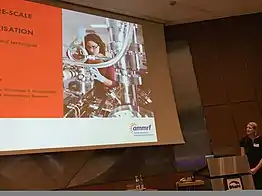Julie M Cairney | |
|---|---|
| Born | Julie M Cairney |
| Alma mater | University of New South Wales (BEng, PhD) |
| Scientific career | |
| Fields | Microstructural Characterisation Materials science |
| Institutions | University of Sydney |
| Thesis | (2002) |
| Doctoral advisor | Paul Munroe |
| Website | sydney |
Julie M. Cairney is a professor in the School of Aerospace, Mechanical and Mechatronic Engineering[1] at the University of Sydney and Director of the Australian Centre for Microscopy and Microanalysis and CEO of Microscopy Australia,[2][3][4] a national user facility funded by the National Collaborative Research Infrastructure Strategy (NCRIS). She is an expert in microscopy, focusing on the understanding and characterization of materials used for structural applications, renewable energy, medical science[5][6] and geosciences[7][8] including the use and development of the atom probe microscope.[9]
Early life and education
Cairney grew up in Broken Hill,[9] an outback town in Australia. She studied for her Bachelor of Metallurgical Engineering (Physical Metallurgy) at the University of New South Wales sponsored by Pasminico Limited and graduated in 1998.[1] Subsequently, she undertook PhD studies with Professor Paul Munroe[9] also at the University of New South Wales and completed her PhD in 2007.
Research

After her PhD, in 2001-2002 Cairney undertook a Royal Academy of Engineering funded research fellowship[9] with Professor Ian Jones at the University of Birmingham.[1] In 2002, she was a Vice Chancellor's Post-doctoral Fellow with Prof. Mark Hoffman at the University of New South Wales, with a stint as a visiting scientist in 2004 with Professor Manfred Rühle[9] at the Max Planck Institute in Stuttgart.[1] In 2006, Cairney moved to the University of Sydney as a Lecturer and established a materials characterisation group. Since moving Cairney has occupied the role of Associate Dean Talented Students Program Showcase in the Faculty of Science,[10] the Director of the Sydney Microscopy and Microanalayis[1] and Head of Research for the School of Aerospace, Mechanical and Mechatronic Engineering. In service to the microscopy community, since 2014 Cairney serves on the Advisory Board for the Journal "Ultramicroscopy"[9][11] and since 2014 she serves on the International Steering Committee for the International Field Emission Society (IFES)[9] and currently is Vice-President of IFES.[12] Her research spans materials science, medicine, and geosciences, with recent applications which enable the understanding of the structure of tooth enamel[5][8] as well as advanced materials for mining.[13] Cairney is one of the youngest full professors at the University of Sydney and one of the few female professors of engineering in Australia.[7] Cairney has also served on the Australian Research Council College of Experts and the New Zealand Marsden Fund.[14]
Awards
Her awards include:
- 2005 JSPS Short-Term Fellowship[15]
Books
Atom Probe Microscopy by Baptiste Gault, Michael P. Moody, Julie M. Cairney and Simon P. Ringer[16]
References
- 1 2 3 4 5 "Professor Julie Cairney". sydney.edu.au.
- ↑ Jonathan Bradley (13 September 2018). "Australia's most powerful electron microscope is the "ultimate nanotechnology tool"". createdigital.org.au. Retrieved 28 November 2018.
- ↑ "Microscope That Gets to the Heart of Matter". Science and Technology Research News. 13 September 2018. Archived from the original on 29 November 2018. Retrieved 1 March 2020.
- ↑ "Appointment of New CEO for the AMMRF". ammrf.org.au. Retrieved 29 November 2018.
- 1 2 "Tooth decay: Drilling down to the nanoscale: Researchers believe they have identified some nanoscale elements that govern the behavior of our teeth". ScienceDaily. Retrieved 28 November 2018.
- ↑ "In the future there will be no more dentists". engineersaustralia.org.au. Retrieved 28 November 2018.
- 1 2 "Julie Cairney". World Economic Forum. Retrieved 28 November 2018.
- 1 2 "Microscope that gets to the heart of matter". The University of Sydney. Retrieved 28 November 2018.
- 1 2 3 4 5 6 7 "Materials Down Under: Prof Julie Cairney". Materials Today. Retrieved 28 November 2018.
- ↑ Science, Faculty of. "Talented Student Program". sydney.edu.au. Retrieved 28 November 2018.
- ↑ Ultramicroscopy Editorial Board.
{{cite book}}:|website=ignored (help) - ↑ "Current International Steering Commitee [sic] composition". fieldemission.org. Retrieved 1 March 2020.
- ↑ "ARC Linkage Grants reward cutting-edge research". sydney.edu.au. Retrieved 1 March 2020.
- ↑ "Enabling Technologies Technical Exchange Meeting 23-24 May 2016" (PDF). Archived from the original (PDF) on 17 February 2017. Retrieved 1 March 2020.
- ↑ "How to become an engineer, according to someone who made it". vogue.com.au. 17 July 2017. Retrieved 28 November 2018.
- ↑ Gault, Baptiste; Moody, Michael P.; Cairney, Julie M.; Ringer, Simon P. (27 August 2012). Atom Probe Microscopy. Springer Science & Business Media. doi:10.1007/978-1-4614-3436-8. ISBN 9781461434368. LCCN 2012936826. OL 27018985M. S2CID 92678441. Retrieved 29 November 2018.